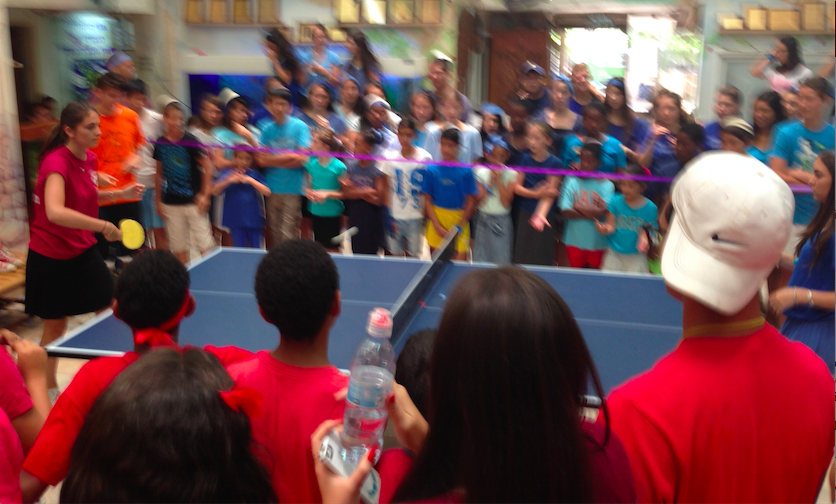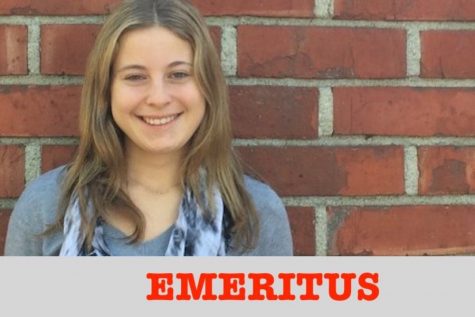In Israel’s North, staying safe means staying home for 250 underprivileged children
HOME FRONT:Day trips have been replaced by activities closer to the bomb shelter at the Beit Elazraki home for underprivileged kids in Netanya this summer.
July 14, 2014
NETANYA, Israel, July 14 — Only a few weeks ago was I studying arduously for finals, but today it feels like months ago.
For the past few weeks I have been in Israel volunteering at Bet Elazraki, a group home for children whose parents cannot adequately care for them. Located in Netanya, Bet Elazraki is home to more than 250 children ranging from babies to 18-year-olds, who have been removed from their parents’ custody because of violence in the home, drug or alcohol abuse, mental illness, poverty, abandonment or some combination of those.
This summer, 38 American teenagers, including me, are living at the home and acting as camp counselors and companions for the children.
When I arrived June 26, I immediately sensed a pronounced concern among Israelis for the safety of the three boys who had been kidnapped near Gush Etzion. Four days later, tensions heightened alarmingly with news that the boys had been found dead, murdered shortly after they had been abducted. Devastated, I was dismayed that our collective prayers for their safe return had been in vain. Similarly pained, some of my fellow Americans cried, which, at the time, left me feeling like my own reaction was not strong or deep enough.
My counselors called a meeting both to air our feelings and to pray for the boys, their families, and peace in Israel. A shared desire among the counselors to attend the funerals the following day was set aside because we were officially to begin programming with the kids, and did not want to disrupt the relative normalcy of their environment and respective routines.
But with the escalating violence, from the horrific burning of one Palestinian boy and the police beating of another, to the interminable hailstorm of rockets from Gaza and persistent responsive fire from Israel, our schedule has been anything but routine.
Prior to the mounting missile attacks throughout Israel, everyone at Bet Elezraki went on daily field trips. Then, after having dinner with our campers and putting them to sleep, we counselors were allowed to leave the home and go into town for dinner or a break.
Now, with the constant rocket fire directed at nearby Tel Aviv, Ashdod and Hadera, our activities have been strictly curtailed. Neither the children nor the American counselors are permitted to leave the home. Off-premises events have been replaced by creative indoor adventures.
Group leaders are working tirelessly to craft fun and interesting programs for the children on the grounds of Bet Elazraki, despite the challenging restrictions on our movements. Today we had color war, with everyone split into two teams, red and blue.
We have also all been instructed about emergency protocol. We were told that if we hear sirens — alerting us to oncoming rockets — we have two minutes and 45 seconds to get to bomb shelters beneath the home. Seemingly a short period to of time to move the approximately 250 children and adults of Bet Elazraki into the shelters, this time frame is generous compared to many in the South who have a mere 15 seconds to reach safety.
Still, and despite the barrage of rocket-fire in neighboring towns, I have felt safe at Bet-Elazraki, and have so informed family members, teachers and friends who have called repeatedly, concerned about my well-being. Though Netanya is not considered the safest of Israeli cities – gangs and increased crime are present – it is ostensibly not a target for terrorists.
So I had heard many stories in Israel about people living in constant fear of rockets, but I could never relate. Until yesterday.
At about 4:35 p.m., sirens rang out through Netanya. My friends and I were eating sushi and talking in the stairwell that leads to our rooms when we heard the dreaded siren. We ran to the bomb shelter in the allotted time, and remained there for 10 minutes.
Though it turned out to be a false alarm, when it happened I was scared, and at that moment, I finally understood what some Israelis go through daily.
I don’t know what harm tomorrow, or even tonight, may bring. I do know that I want to remain here, with the children at Bet Elazraki for the duration of the program. I am proud to stand with my people and the members of the IDF as they try to rout terrorism from the State of Israel, and I will continue to pray for an end to the conflict and for peace throughout the land.
Related: A Summer Defined by War
Related: Summer of War: For Arab teens, a similar summer but with more death
Related: Summer of War: Hollywood, too, was divided
Related: Summer of War: Jewish law, though sparse, leans toward self-defense
Related: A view from Israel: Who am I, who are we?














